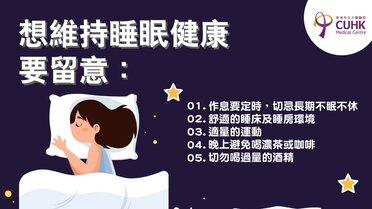Sleep Health
Sleep Health
Sleep HealthSleep Health
Different stages of sleeping
A night of sleep can be roughly categorized into two stages: non-REM sleep and REM sleep. Brain wave activity, eye movement and muscle tension are vastly different in these two stages.
Non-REM sleep can be further divided into three phases:
- Phase one: Light sleep; easily awakened; muscles relax with occasional twitches; eye movements are slow.
- Phase two: Eye movements stop; slower brain waves, with occasional bursts or rapid brain waves.
- Phase three: “Deep sleep”; it occurs soon after falling asleep and mostly in the first half of the night. Difficult to awaken; large and slow brain waves; heart rate and breath are slow and muscles are relaxed.
During REM sleep, eyes move rapidly behind closed eyelids, breathing becomes shallower, heart rate and blood pressure increases. Dreaming occurs during this stage while arms and legs are temporarily paralysed.
After falling asleep, sleep cycle alternates between non-REM and REM sleep about every 90 minutes, with 3 – 5 cycles per night.
Sleep-wake disorder and associated health risks
According to the 2014-2015 general health census, about half (48%) among the population aged 15 years or above have had sleep issues in the past 30 days. According to Diagnostic and Statistical Manual of Mental Disorders, 5th Edition (DSM-5), three months or more of sleep issues could suggest a sleep disorder, and will lead to tiredness, anxiety, lower work efficiency, affecting daily living.
| Sleep health assessment |
|---|
The Epworth Sleepiness Scale allows you to have a basic understanding of your sleep health through evaluating your drowsiness during the day. [Click here to begin the assessment] *This assessment is for reference only. Clinical consultation and check-up are required for a thorough evaluation of your sleep health. |
Sleep-wake disorder is a catch-all phrase of some 80 different medical conditions. Some conditions have unknown causes, while others are due to diseases, pain, mood disorders (such as depression, anxiety), or medications. Other factors include aging, excessive caffeine and alcohol intake, irregular rest schedules (such as working in shifts) are also probable causes. Common sleep-wake disorder includes chronic insomnia (including difficulty in falling or staying asleep, early-waking) and sleep apnea etc.
Epidemiological studies show that sleep deprivation or sleep of suboptimal quality are associated with certain health risks, such as obesity1, endocrine disorders2, Type II diabetes3, cardiovascular diseases4-6, certain cancers7-10, and mood disorders11. Another research suggests that a lengthy sleep (9 hours or more per night) will also increase adults’ risk in chronic diseases4,12,13. However in reality, sleep deprivation is a more salient issue than long sleep duration.
Sleep-wake disorder is mostly curable – common solutions include medication, cognitive behaviour therapy/relaxation techniques, CPAP (Continuous Positive Airway Pressure) ventilators. If you are concerned about your sleep health, you are recommended to seek doctors’ consultation as soon as possible to minimize its impact on both your physical and mental health and long-term well-being.
| Tips to better sleep health |
|---|
|
















